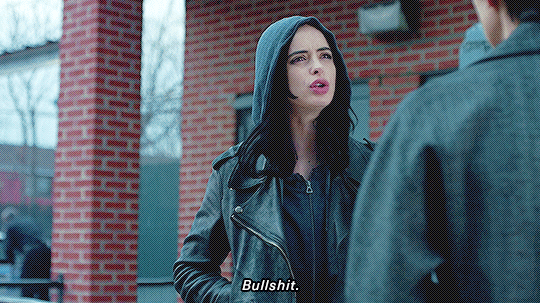Delayed Impressions: Netflix’s Jessica Jones, Season 1
This article contains spoilers for Season 1 of Jessica Jones. You’ve been warned.
I’ve been trying to get my thoughts in order over Jessica Jones ever since I binge-watched the series. Getting the right words down has been difficult, because it’s is not an easy show to watch. It’s not built along the lines of what we’ve perhaps come to expect from superheroes since our television sets and our theaters are so full of them of late.
But I want to talk about how this show lures you in anyway. How you may wonder for a bit if you should go on, because Jessica’s not a heroine that draws you close and makes you comfortable. She pushes you away with sarcasm and an almost unsettling kind of comfort in her “Me Against the World” attitude, which is the recurring spiel throughout Netflix‘s first season (because why yes, it’s now been greenlit for a take two). “This is my problem,” she says. “I’ll handle it. Go away.”

Your heroine is broken, guys. She’s damaged goods, and has had so much shit to deal with up close and in her face. She’s pretty sure holding everyone at arm’s length is the most effective kind of protection for everybody else. Get far away from her and you’re not collateral damage in this twisted take on courtship from a psychopath that she wants nothing to do with.
She’s not the girl whose opening jingles we sing because she makes us feel good to follow her exploits. She’s not the kind of girl who’s success story you celebrate. Because in spite of having super strength enough to punch walls and bend metal chairs, the weight of the circumstances that she broke under is a weight she never wants for anyone else.
In the ongoing dialogue surrounding the portrayal of women in fictional mediums of all kinds, I’ve done my best to follow as best I can. This issue is relevant to me not just as a woman, but as a reader, a member of a watching audience, and ultimately, as a fan.
When I first encountered Jessica Jones as a supporting character in Allan Heinberg and Jim Cheung’s Young Avengers, I literally had no idea who she was or that she was even part of the Marvel Universe. What got to me was her exchange with Kate Bishop in the YA Special on feeling helpless as a victim and getting back up again to take control over your life and your actions and how you deal with that kind of trauma. It’s a common trope: girls turn to heroism because they fell first somewhere before they became awesome. They get up and fight because they had a really rude awakening to the fact that the world is not a kind and safe place.
I personally have raged a lot over the use of rape as a plot hook for female protagonists. I was tired of it seeming to be a given, like some item on this checklist of what makes a girl “tough” and “strong”. There’s a call to talk a lot about women’s empowerment because it’s a feeling we’re viscerally, intimately familiar with — and it doesn’t always mean that we were abused or beaten to an inch of our lives. Instead, it’s that kind of nebulous helplessness because there is so much talk about “this is how a girl is,” from everyone and everywhere else. It’s like the world is trying to figure out whether letting girls be the heroes in our own stories is a tale worth telling.




